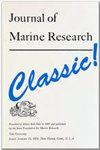Isolasi dan Identifikasi Bakteri Pengurai Mikroplastik Polyethylene Terephthalate dari Sedimen Ekosistem Mangrove Pasir Putih
IF 0.5
4区 地球科学
Q3 Earth and Planetary Sciences
引用次数: 0
Abstract
Polyethylene terephthalate (PET) adalah salah satu polimer termoplastik paling banyak tersedia di pasar. PET digunakan untuk produksi botol atau wadah untuk minuman, seperti air, minuman ringan berkarbonasi, minuman jus, dan industri makanan. Polyethylene terephthalate (PET) ditemukan melimpah pada sedimen ekosistem mangrove di Pasir Putih Wonorejo pada musim hujan sebanyak 59%. Studi terbaru telah menunjukkan bahwa bakteri indigenous sedimen mangrove mampu mendegradasi mikroplastik. Sehingga, tujuan penelitian ini adalah menemukan potensi agen biodegradasi mikroplastik dari bakteri indigenous sedimen ekosistem mangrove di Pasir Putih Wonorejo. Bakteri diisolasi pada April 2022 dari sedimen ekosistem mangrove. Metode yang digunakan diawali dengan isolasi bakteri dari sedimen ekosistem mangrove Pasir Putih Wonorejo, kemudian digunakan untuk uji degradasi mikroplastik polyethylene terephthalate dan mengetahui jenis bakteri yang memiliki kemampuan mendegradasi mikroplastik. Hasil isolat bakteri yang didapat sebanyak 16 bakteri. Potensi bakteri yang menjadi agen biodegradasi dengan penurunan berat mikroplastik isolat bakteri SPP.1.1.3. sebesar 8,73%. Identifikasi molekuler dengan cara ekstraksi DNA 16S rRNA menunjukkan jenis Pseudoaltoromonas caenipelagi dengan homologi 99% pada database National Center Biotechnology Information. Hasil ini membuktikan bahwa bakteri indigenous memiliki kemampuan sebagai agen biodegradasi mikroplastik. Polyethylene terephthalate (PET) is one of the most widely available thermoplastic polymers on the market. PET is used for the production of bottles or containers for beverages, such as water, carbonated soft drinks, juices, and the food industry. Polyethylene terephthalate (PET) is found abundantly in mangrove ecosystem sediments in Pasir Putih Wonorejo during the rainy season as much as 59%. Recent studies have shown that indigenous mangrove sediment bacteria are able to degrade microplastics. Thus, the purpose of this study was to find potential agents for biodegradation of microplastics from indigenous bacteria in mangrove ecosystem sediments Pasir Putih Wonorejo. Bacteria were isolated in April 2022 from mangrove ecosystem sediments. The method used begins with The isolation of bacteria from mangrove ecosystems sediments from Pasir Putih Wonorejo, then were used to assay biodegradation of polyethylene terephthalate microplastics and to determine the types of bacteria that has ability to degrade microplastics. The results of isolated bacterial obtained were 16 bacterias. The potential bacteria that becoming agents of biodegradation by decreasing the weight of microplastic isolate SPP.1.1.3. by 8,73%. Molecular identification by extraction of DNA 16S rRNA showed the type of Pseudoaltoromonas caenipelagi with 99% homology in the National Center Biotechnology Information database. These results prove that indigenous bacteria have the ability as microplastic biodegradation agents.聚乙烯是市场上最容易获得的热塑性聚合物之一。PET被用来生产瓶装或容器,如水、碳酸软饮料、果汁和食品行业。在雨季,在Wonorejo的白沙上发现了大量的磷酸铵。最近的研究表明,未受抑制的沉积物具有可降解微塑料的能力。因此,这项研究的目的是在Wonorejo白色沙地上发现一种无菌沉积物,其潜在的微生物降解剂。细菌于2022年4月从红树林生态系统的沉积物中分离出来。使用的方法从带壳的白沙红树林生态系统沉积物中分离出细菌,然后用于检测聚酯微塑料降解,并了解带有微塑料降解能力的微生物类型。我们得到了16种细菌的分离物。潜在的细菌是一种生物降解的病原体,其重量为1.1.3细菌隔离微生物。8,73%大小。通过DNA提取16S rRNA的DNA鉴定,分子鉴定与国家生物技术信息数据库99%相同。这些结果证明无抑制细菌具有微塑料生物降解的能力。聚酯是市场上最可靠的热塑性聚酯聚酯之一。这只宠物是用来生产瓶子或容器的,就像水、碳酸饮料、果汁和食品工业一样。聚乙烯沉积在mangrove ecosystem中,沉积在白色的沙上,价格为59%。Recent studies shown that ininous mangrove沉积细菌有可能退化微生物。因此,这项研究的目的是寻找一种潜在的生物降解剂,用于从红树林生态系统中不可抑制的细菌沉积白沙Wonorejo。细菌于2022年4月从红树林生态系统沉积物中分离出来。从mangrove ecosystems从Wonorejo的白沙中提取的细菌孤立开始,然后用来确定一种用于分解微塑料的化合物。被隔离细菌的结果是16种细菌。由微小塑料SPP.1.1.3分解生物降解的潜在细菌制剂。由8,73%。DNA提取16S rRNA展示的伪分子识别类型与国家生物技术信息数据库中99%的同质。这些结果证明,无菌细菌具有微生物保护的能力。
本文章由计算机程序翻译,如有差异,请以英文原文为准。
求助全文
约1分钟内获得全文
求助全文
来源期刊

Journal of Marine Research
地学-海洋学
自引率
0.00%
发文量
1
审稿时长
3 months
期刊介绍:
The Journal of Marine Research publishes peer-reviewed research articles covering a broad array of topics in physical, biological and chemical oceanography. Articles that deal with processes, as well as those that report significant observations, are welcome. In the area of biology, studies involving coupling between ecological and physical processes are preferred over those that report systematics. Authors benefit from thorough reviews of their manuscripts, where an attempt is made to maximize clarity. The time between submission and publication is kept to a minimum; there is no page charge.
 求助内容:
求助内容: 应助结果提醒方式:
应助结果提醒方式:


